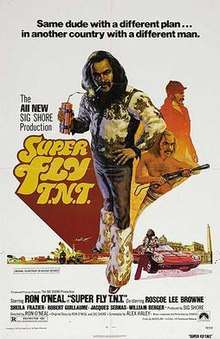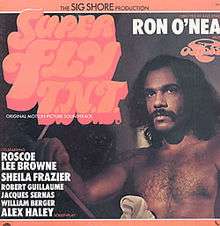Super Fly T.N.T.
| Super Fly T.N.T. | |
|---|---|
 Theatrical release poster | |
| Directed by | Ron O'Neal |
| Produced by | Sig Shore |
| Screenplay by | Alex Haley |
| Story by |
Ron O'Neal Sig Shore |
| Starring |
Ron O'Neal Roscoe Lee Browne Sheila Frazier Robert Guillaume Jacques Sernas William Berger |
| Music by | Osibisa |
| Cinematography |
Robert Gaffney James Signorelli |
| Edited by | Bob Brady |
Production company |
Superfly Ltd.[1] |
| Distributed by | Paramount Pictures[1] |
Release date |
|
Running time | 87 minutes |
| Country | United States |
| Budget | $1.5 million[2] |
Super Fly T.N.T. is a 1973 American blaxploitation crime drama film directed and starring Ron O'Neal. O'Neal reprises his role of Youngblood Priest from the 1972 film Super Fly. The film was both a critical and commercial failure.
The film was released on VHS in 1998, but it has not been released on DVD or Blu-ray. It was shot in Rome, Italy and other locations. A sequel, The Return of Superfly, was released in 1990, with Nathan Purdee as Priest.
Plot
Former drug dealer Youngblood Priest, after making a big score in Harlem by betraying the corrupt police deputy commissioner, has moved to Europe to live a sedate life with his devoted girl friend Georgia. Despite his luxurious acquisitions, including a Lamborghini, fine clothes and an elegant Rome apartment, Priest is dissatisfied, as he does not know what he now wants out of life.
One evening, Priest attends his weekly poker game, hosted by European entrepreneur Matty Smith. Although Matty and some of the players disparage his drug usage, Priest indulges in the cocaine offered by one player and, as usual, emerges the night’s big winner. Priest is irritated by the unexpected arrival of Dr. Lamine Sonko, a somber, dignified resident of Umbria, a West African nation. Sonko, who is eager to talk with Matty, does not disguise his feelings that Priest and the others are wasting their time playing cards, and the irate Priest leaves. When they are alone, Sonko reveals to Matty that the most recent weapons shipment supplied by Matty to the revolutionary forces represented by Sonko has been destroyed by mercenary troops hired by Umbria’s colonial government.
Matty, who maintains only a financial interest in Sonko’s cause, tells him that while the diamonds with which Sonko pays him are of high quality, because Sonko is not in the diamond cartel, it is difficult and time-consuming to sell the gems. Although Sonko has always given him far more in diamonds than the weapons are worth, Matty refuses to do business with him again, suggesting that he find another buyer to whom he can sell the diamonds for cash, with which he can then purchase the weapons. Meanwhile, Georgia, having made the acquaintance of African-American novelist Jordan Gaines, arranges for her and Priest to have dinner with Jordan and his European girl friend Lisa. Despite his initial reluctance to socialize with a stranger, Priest finds himself enjoying the company of a fellow expatriate.
That night, when they return home, Georgia questions Priest about his moodiness, and he admits that he no longer knows what he wants to do, other than rise above his former existence as a hustler. Georgia reveals that she wants to start a family, but Priest vetoes the idea, stating that “the way this world is,” he cannot bring a child into it. He assures Georgia that he loves her, however, and assents that maybe someday they can have a baby. Meanwhile, Sonko approaches one of the poker players and offers to pay his gambling debts if he will procure information about Priest, who is financially independent.
One day, the intellectual, socially conscious Jordan takes Priest on a sight-seeing tour of Rome, and the two men marvel at how lucky the Italians are to live amidst centuries of their own history, unlike African Americans. They discuss the political and economic situation of blacks in America and after Priest admits that he used to sell cocaine, he firmly tells Jordan that he is never “returning to the funk.” After an uncomfortable lesson with a high-society riding instructor, the sore Priest is approached by Sonko, who pleads with him to help Umbria by accepting the diamonds and purchasing the much-needed materials. Despite Sonko’s stirring proclamation that they are brothers in the same battle against colonial powers, Priest demurs, stating that he is no longer interested in “uptight deals.” When Georgia returns home that night, she finds a drunken Priest insisting that they leave Rome. Tired of their nomadic lifestyle, Georgia declares that she is happy in Rome and will not follow Priest as he constantly runs from self-awareness.
Depressed and seeking focus, Priest spends a long sojourn in Africa, especially Umbria, and is deeply moved by the people and the poverty in which they live. Returning to Rome, Priest is met by Sonko, who is pleased when the former drug dealer questions him about the guns. At another poker game, Priest, who refuses an offer of cocaine, plays a grueling, high-stakes game and eventually wins a huge sum from Matty. When Matty asks for a few days to pay his markers, Priest offers to accept as payment the weapons needed by Umbria. Matty reluctantly agrees, and Priest’s next challenge is to get the guns passed through Italian customs. With the aid of a generous bribe, Priest is soon overseeing the loading of the guns, ammunition and grenades onto a plane that is to land at a small airstrip in the Umbrian countryside where the rebels are fighting.
Sonko gives Priest his card and instructs him to contact him in Umbria if there is an emergency. After bidding farewell to the nervous Georgia, Priest boards the plane, which lands in Africa at night. Unfortunately, the governmental forces have been alerted to the shipment’s arrival and the mercenaries capture Priest, although the weapons are safely shepherded to the revolutionaries. Priest refuses to talk to Lefevre, the head of the mercenaries, even after Sonko’s card has been found hidden in his clothes. Lefevre orders his two henchmen, Rik and Rand, to torture Priest, but the resilient Priest refuses to divulge anything. He is tossed into a cell but revives after Rik and Rand throw a bucket of water over him, drenching the cell’s floor. Lefevre then calls Sonko, demanding the arms in exchange for Priest’s life. Although Sonko deplores the sacrifice of a good man, he knows that the struggle must continue, no matter what the cost.
Priest cleverly fashions a weapon using the cell’s light switch, overhanging light bulb and the water-soaked floor, and after Lefevre departs to attend to business, Priest electrocutes Rik. He takes the dead soldier’s knife and slits Rand’s throat, then staggers out into the sunlight. In the brush, Priest is approached by three African men, and soon after, returns to Italy, where he is greeted by a relieved Georgia. Embracing Georgia, Priest eyes the airplanes overhead and looks forward to his future.[3]
Cast
| Actor | Role |
|---|---|
| Ron O'Neal | Youngblood Priest |
| Roscoe Lee Browne | Dr. Lamine Sonko |
| Sheila Frazier | Georgia |
| Robert Guillaume | Jordan Gaines |
| Jacques Sernas | Matty Smith |
| William Berger | Lefebre |
| Roy Bosier | Daggett |
| Silvio Noto | George, Restaurant Proprietor |
| Olga Bisera | Lisa |
Soundtrack
| Super Fly T.N.T. | ||||
|---|---|---|---|---|
 | ||||
| Soundtrack album by Osibisa | ||||
| Released | September 24, 1973 | |||
| Recorded | April 1973 | |||
| Genre | British Afro-pop | |||
| Length | 53:57 | |||
| Label | Red Steel Music | |||
| Producer | Peter Gallen | |||
| Osibisa chronology | ||||
| ||||
| Professional ratings | |
|---|---|
| Review scores | |
| Source | Rating |
| Allmusic | |
The soundtrack was done by Ghanaian band Osibisa and charted at #159 on the Billboard charts and #41 on R&B albums.[4][5] It has been re-issued on CD in 1995.[6]
Track listing
All songs arranged, performed and composed by Osibisa.
| No. | Title | Length |
|---|---|---|
| 1. | "T.N.T." | 6:51 |
| 2. | "Superfly Man" | 3:56 |
| 3. | "Prophets" | 5:25 |
| 4. | "The Vicarage" | 3:32 |
| 5. | "Oye Mama" | 3:26 |
| 6. | "Brotherhood" | 4:12 |
| 7. | "Come Closer (If You're A Man)" | 5:23 |
| 8. | "Kelele" | 5:37 |
| 9. | "La Ila La La" | 7:35 |
| Total length: | 53:57 | |
Musicians
Teddy Osei, from Ghana; - tenor sax, flute, African drums & vocals
Sol Amarfio, from Ghana; - drums
Mac Tontoh, from Ghana; - trumpet, flugel horn, kabasa
Jean Mandengue, from the French Cameroons; – bass guitar, percussion, vocals
Gordon Hunte, from Guyana; - lead guitar & vocals
Robert Bailey, from Trinidad; - organ, piano, timbales
Kofi Ayivor, from Ghana; - congas, African drums, percussion, vocals
Additional brass arrangements by Mike Gibbs
All information taken from the album back cover
In popular culture
- In the 1994 film Pulp Fiction, Jules Winnfield, portrayed by Samuel L. Jackson (who acts in The Return of Superfly), says to John Travolta's Vincent Vega, "Every time my fingers touch brain, I'm Super Fly T.N.T. I'm the Guns of the [sic] Navarone"[7]
References
- 1 2 "Super Fly T.N.T. (1973) - Credits". AFI Catalog of Feature Films. Retrieved March 23, 2018.
- ↑ "Ron O'Neal Will Direct Sequel to Super Fly". Jet. November 2, 1972. p. 55.
- ↑ "Super Fly T.N.T. (1973) - Synopsis". AFI Catalog of Feature Films. Retrieved March 23, 2018.
- ↑ "Osibisa's Biography". Last.fm. 2008-11-21. Retrieved 2010-10-06.
- ↑ "Super Fly TNT > Charts & Awards > Billboard Albums". allmusic. Retrieved 2010-10-06.
- ↑ "Red Steel Music". Red Steel Music. Retrieved 2016-07-15.
- ↑ "View Quote ... Pulp Fiction ... Movie Quotes Database". Moviequotedb.com. Retrieved 2017-09-28.